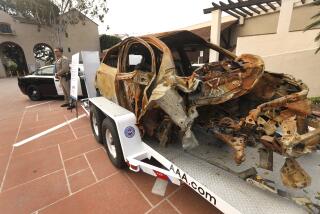Cellphones and Toyota defects divert attention from bigger highway safety issues, group says
- Share via
Problems such as drivers using cellphones or Toyota’s series of recalls for unintended acceleration are distracting from other significant highway safety issues, the Insurance Institute for Highway Safety said Monday.
About 100 people die each day in traffic accidents on the nation’s roads, but regulators and other officials are too easily distracted by issues that have little effect on the death rate, the institute said.
Preoccupation with Toyota and cellphone use “diverts attention from initiatives that have far greater potential to save lives,” said Adrian Lund, the president of the institute, a nonprofit that analyzes auto safety and driving issues.
Lowering speed limits, installing mechanical speed restrictions on the nation’s commercial trucking fleet, increasing enforcement — including more red-light cameras — to prevent red-light running and constructing roundabouts at many intersections to remove signals would all have a bigger effect on traffic safety, the institute said.
“Study after study conducted on U.S. roads and elsewhere confirms the safety benefits of posting lower limits … yet policymakers are going the other way, raising speed limits to 70, 75 and even 80 mph,” the institute said.
Moreover, in jurisdictions where hand-held phone use has been banned, crash patterns have held steady “and by this essential measure the benefits of hand-held cellphones bans are nil,” Lund said.
Lund said that there is a risk to driving while talking on the phone, just as there are with other distractions, but that it is likely that once a driver puts the phone down, the individual finds some other way to be distracted while operating the vehicle, and that’s why crash rates have not fallen.
Regulators and automakers should be talking more about crash avoidance systems that work to prevent accidents regardless of the reasons for driver distraction rather than focusing so much on hand-held phone use, the institute said.
Lund also acknowledged that Toyota’s safety defects are problems that need to be addressed and investigated but added that the issue was pushing more important safety debates into the background.
“Priority belongs to measures that address the biggest highway safety issues and promise to save the most lives,” Lund said.
jerry.hirsch@latimes.com







